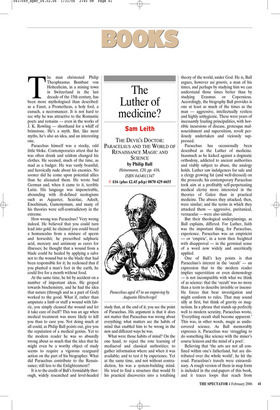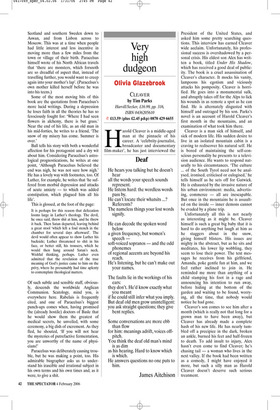The Luther of medicine?
Sam Leith
THE DEVIL’S DOCTOR: PARACELSUS AND THE WORLD OF RENAISSANCE MAGIC AND SCIENCE by Philip Ball Heinemann, £20, pp. 416, ISBN 0434011347 ✆ £16 (plus £2.45 p&p) 0870 429 6655 The man christened Philip Theophrastus Bombast von Hohenheim, in a mining town in Switzerland in the last decade of the 15th century, has been more mythologised than described: as a Faust, a Prometheus, a holy fool, a eunuch, a necromancer. It is not hard to see why he was attractive to the Romantic poets and remains — even in the works of J. K. Rowling — shorthand for a whiff of brimstone. He’s a myth. But, like most myths, he’s also an idea, and an interesting one.
Paracelsus himself was a stocky, odd little bloke. Contemporaries attest that he was often drunk and seldom changed his clothes. He seemed, much of the time, as mad as a badger. He was vastly boastful, and heroically rude about his enemies. No sooner did he come upon potential allies than he alienated them. He wrote bad German and, when it came to it, terrible Latin. His language was impenetrable, abounding with ill-defined neologisms such as Aquaster, Scaiolae, Adech, Enochinum, Gamonymum, and many of his theories were self-contradictory in the extreme.
How wrong was Paracelsus? Very wrong indeed. He believed that you could turn lead into gold; he claimed you could breed a homunculus from a mixture of sperm and horseshit; he prescribed sulphuric acid, mercury and antimony as cures for illnesses; he thought that a wound from a blade could be healed by applying a salve not to the wound but to the blade that had been responsible for it; he reckoned that if you planted a man’s feet in the earth, he could live for a month without food.
At the same time, he hit by accident on a number of important ideas. He groped towards biochemistry, and he had the idea that nature (through and as a part of God) worked to the good. What if, rather than amputate a limb or stuff a wound with fabric, you simply cleaned the wound and let it take care of itself? This was an age when medical treatment was more likely to kill you than to cure you. Not doing much at all could, as Philip Ball points out, give you the reputation of a medical genius. Yet to the modern reader he was so absurdly wrong about so much that the idea that he might even be a worthy object of study seems to require a vigorous rearguard action on the part of his biographer. What did Paracelsus contribute to the Renaissance; still less to the Enlightenment?
It is to the credit of Ball’s formidably thorough, widely researched and level-headed study that, at the end of it, you see the point of Paracelsus. His argument is that it does not matter that Paracelsus was wrong about everything; what matters are the habits of mind that enabled him to be wrong in the new and different ways he was.
What were those habits of mind? On the one hand, to reject the rote learning of mediaeval and classical authorities; to gather information where and when it was available; and to test it by experience. Yet at the same time, and not without contradiction, his was a system-building mind. He tried to find a structure that would fit his practical discoveries into a totalising theory of the world, under God. He is, Ball argues, however sui generis, a man of his times, and perhaps by studying him we can understand those times better than by studying Erasmus or Copernicus. Accordingly, the biography Ball provides is one at least as much of the times as the man — aggressive, intellectually restless and highly unhygienic. These were years of incessantly feuding principalities, with horrible incursions of disease, grotesque malnourishment and superstition, revolt perilously undertaken and viciously suppressed.
Paracelsus has occasionally been described as the Luther of medicine. Inasmuch as he kicked against a dogmatic orthodoxy, addicted to ancient authorities and visibly subject to abuse, the analogy holds. Luther saw indulgences for sale and a clergy growing fat (and well-dressed) on the proceeds; his contemporary Paracelsus took aim at a profitably self-perpetuating medical clerisy more interested in the theories of Galen than in practical medicine. The abuses they attacked, then, were similar; and the terms in which they attacked them — aggressive, puritanical, vernacular — were also similar.
But their theological underpinnings, as Ball explains, differed. For Luther, faith was the important thing, for Paracelsus, experience. Paracelsus was an empiricist — or ‘empiric’, in a term then freighted with disapproval — in the germinal sense of a word now widely and uncritically applied.
One of Ball’s key points is that Paracelsus’s interest in the ‘occult’ — an expression that to the modern reader implies superstition or even demonology — is not incompatible with what we think of as science: that the ‘occult’ was no more than a term to describe invisible or insensible forces that bear investigation and might conform to rules. That may sound silly at first, but think of gravity or magnetism. In a phrase that stands up perfectly well to modern scrutiny, Paracelsus wrote, ‘Everything occult shall become apparent.’ This was, in other words, magic as undiscovered science. As Ball memorably expresses it, Paracelsus was ‘struggling to do something like science with the miner’s coarse lexicon and the mind of a poet’.
Believing that ‘the arts are not all confined within one’s fatherland, but are distributed over the whole world’, he hit the road. Paracelsus’s travels were extraordinary. A rough version of them in map form is included in the end-papers of this book, and it traces loops that reach from Scotland and southern Sweden down to Aswan, and from Lisbon across to Moscow. This was at a time when people had little interest and less incentive in moving more than a few miles from the town or village of their birth. Paracelsus himself wrote of his North African travels that ‘there are monsters, which forsooth are so dreadful of aspect that, instead of travelling further, you would want to creep again into your mother’s lap’. (Paracelsus’s own mother killed herself before he was into his teens.) Some of the most moving bits of this book are the quotations from Paracelsus’s more lucid writings. During a depression he loses faith in all the theories he has so ferociously fought for: ‘Where I had seen flowers in alchemy, there is but grass.’ Near the end of his life, as an old man in his mid-forties, he writes to a friend, ‘The snow of my misery has come. Summer is over.’ Ball tells his story with both a wonderful affection for his protagonist and a dry wit about him. Considering Paracelsus’s astrological prognostications, he writes at one point, ‘Although Paracelsus believed the end was nigh, he was not sure how nigh.’ He has a lovely way with footnotes, too. Of Luther, for example, he writes that ‘he suffered from morbid depression and attacks of acute anxiety — to which was added constipation, which plagued him all his life’.
This is glossed, at the foot of the page:
It is perhaps for this reason that defecation looms large in Luther’s theology. The devil, he once said, threw shit at him, and he threw it back. Then Satan departed, leaving behind a great stool ‘which left a foul stench in the chamber for several days afterward’. The devil would often appear to show Luther his backside; Luther threatened to shit in his face, or better still, his trousers, which he would then hang around Satan’s neck. Wishful thinking, perhaps. Luther even admitted that the revelation of the true meaning of God’s justice came to him on the privy, where he presumably had time aplenty to contemplate theological matters.
Of such subtle and sensible stuff, obviously, descends the worldwide Anglican Communion. Scatology, mind you, is everywhere here. Rabelais is frequently cited, and one of Paracelsus’s biggest punch-ups comes when, having promised the (already hostile) doctors of Basle that he would show them the greatest of medical secrets, he unveiled, with some ceremony, a big dish of excrement. As they fled, he shouted, ‘If you will not hear the mysteries of putrefactive fermentation, you are unworthy of the name of physicians!’ Paracelsus was deliberately causing trouble, but he was making a point, too. His admirable biographer asks us to understand his irascible and irrational subject in his own terms and his own times and, as it were, to give a shit.






























































































































 Previous page
Previous page